A New Era for Athletics
Initial moves include a new director of athletics and men's basketball coach and the development of a strategic planning process.
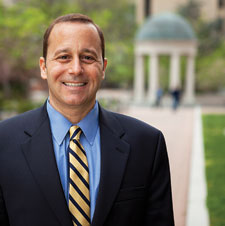
GW appointed Patrick Nero, former commissioner of the America East Conference, as its new athletic director.
Jessica McConnell Burt
Several changes are in the works for GW athletics.
Patrick Nero, former commissioner of the America East Conference, is taking the helm as GW's next director of athletics. He was announced at a press conference in April.
Mr. Nero brings more than 23 years of experience in NCAA Division I sports to GW. He succeeds Jack Kvancz, who is retiring from the position after 17 years (see sidebar).
The America East Conference is an NCAA Division I conference that consists of nine universities participating in 20 sports. While with the America East, Mr. Nero also held leadership roles, such as serving on the NCAA Division I Leadership Council and Management Council and the Women's Basketball Coaches Association Board of Directors. He is past chair of the Division I Commissioners Association and the NCAA Committee on Women's Athletics.
Prior to being named America East Conference commissioner, Mr. Nero was director of athletics at the University of Maine, where seven athletics teams qualified for the post-season over a two-year span during his time, including NCAA championship runner-up men's ice hockey.
Mr. Nero also held leadership roles in athletics at the University of Miami in Florida, Marquette University, Lamar University, and Providence College. As senior associate athletic director for Miami, Mr. Nero directed a capital campaign and major gift activities for the department, including a new convocation center, a football training facility, a track and soccer stadium, and a baseball stadium renovation.
Mr. Nero is a graduate of Providence College and a native of Providence, R.I.
The appointment of Mr. Nero is a key step in shaping the university's athletic future. Some of Mr. Nero's goals for GW athletics include increasing marketing opportunities on television and radio, attracting larger crowds to athletic events, and growing student-athlete involvement with the community. Mr. Nero also noted that involvement and support of GW students and alumni will be essential to elevating athletics at GW.
"I want to help create a winning culture at GW," he said, "and to challenge our coaches and our staff to make sure we're doing everything we can to allow our students to achieve at the highest levels."
In one of his first moves after being named athletic director, he announced that Mike Lonergan, head men's coach at the University of Vermont, will be the next head coach of GW men's basketball (see sidebar). He replaces Karl Hobbs, who was released from his contract in April.
Strategic Review
The announcement of Mr. Nero's hiring was preceded in February by news that the university, at the request of the GW Board of Trustees, has created a committee to begin a comprehensive review of athletics at GW. The new Athletics Committee, chaired by alumnus and GW board member Randy Levine, BA '77, president of the New York Yankees, is leading efforts to evaluate how best to raise the national profile of athletics at GW.
The committee comprises an executive committee, including university trustees and vice presidents, led by Mr. Levine; and a steering committee, led by Robert A. Chernak, senior vice president and senior vice provost for student and academic support services, composed of a range of GW faculty members, staff members, and alumni (some of whom were Colonial athletes).
The Athletics Steering Committee is overseeing the development of a strategic plan for the Department of Athletics. In addition to assessing the state of the university's athletics management, sponsorships, fundraising, and facilities and infrastructure, the Athletics Committee is examining the student-athlete experience at George Washington—including academic support, admissions standards, and scholarships.
The committee also is charged with determining how to preserve and build athletic traditions and boost campus spirit. Diversity, inclusion, and gender equity are being examined, as well as club sports, recreational sports, and health and wellness.
Initial recommendations by the Athletics Steering Committee were submitted to the Executive Committee by the end of the spring semester for inclusion in the GW athletics strategic plan.
Lonergan Brings a Winning Record
Mike Lonergan, who was named the GW men's basketball coach in May, brings to the university 18 years of experience as a college head coach, with an overall coaching record of 377–156. Previously head coach at Vermont, he has deep connections to the Washington metropolitan area. A native of Bowie, Md., he is a graduate of Archbishop Carroll High School and The Catholic University of America, a former assistant coach at the University of Maryland, and former head coach at Catholic University, where he was the winningest coach in the program's history. His record of success includes:
- 13 NCAA Tournament victories and an NCAA Division III national championship
- 12 regular season conference titles
- 10 NCAA Tournament qualifications and five conference tournament championships
- The 2001 Division III National Coach of the Year award and America East Coach of the Year awards in 2007 and 2011, and
- A 100-percent student-athlete graduation rate as head coach.
Stay tuned for a profile of Coach Lonergan in an upcoming edition of GW Magazine.
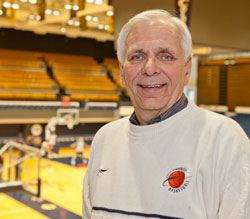
Director Jack Kvancz has led GW Athletics for 17 years.
William Atkins
Jack Kvancz to Continue Advising Athletics
On June 30, Jack Kvancz will retire as GW's athletic director. In his 17-year tenure, Mr. Kvancz guided the growth of GW athletics to its current 22 varsity sports, and led its teams to appearances in the NCAA tournament and victories at the Atlantic 10 championships. He was also involved in major improvements to GW's athletic facilities.
Mr. Kvancz will maintain a presence at GW athletics, serving as a special adviser to Senior Vice Provost and Senior Vice President for Student and Academic Support Services Robert Chernak, and to the newly created Athletics Committee. In this capacity, he will continue to assist the university in implementing the athletic department's new strategic plan.
Mr. Kvancz says: "I'll always be a Colonial."
Kuwaiti Gift Supports Middle East Research
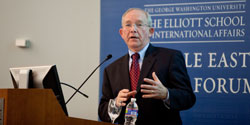
Kuwait Professor of Gulf and Arabian Peninsula Affairs and former Ambassador to Kuwait Edward W. "Skip" Gnehm Jr., BA '66, MA '68, delivers the 2011 Annual Kuwait Chair Lecture.
Jessica McConnell Burt
The government of Kuwait, through the generosity of His Highness the Amir Sheikh Sabah Al-Ahmad Al-Jaber Al-Sabah, has presented the George Washington University with a gift of $4.5 million as an endowment for GW's Institute for Middle East Studies and for the Global Resources Center's Middle East and North Africa Research Center at the Gelman Library.
In 2008, the government of Kuwait presented GW with a gift of more than $1 million to support the Institute for Middle East Studies, which is based at GW's Elliott School of International Affairs. This followed a 2005 gift of $3.4 million from the Kuwait Foundation for the Advancement of Sciences to establish the Kuwait Chair for Gulf and Arabian Peninsula Affairs, which is held by Ambassador Edward W. Gnehm Jr., former U.S ambassador to Kuwait, Jordan, and Australia.
The gift was announced following delivery earlier this year of the 2011 Annual Kuwait Chair Lecture by Mr. Gnehm, BA '66, MA '68, who shared his experiences as U.S. ambassador during the liberation of Kuwait.
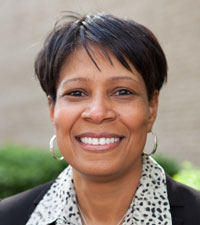
Terri Harris Reed became GW's first provost for diversity and inclusion in May.
William Atkins
A Commitment to Diversity
Terri Harris Reed, GW's first vice provost for diversity and inclusion, will spearhead the university's efforts to enhance the experience of traditionally underrepresented populations and to cultivate a more inclusive climate. Dr. Reed joined GW in May to focus on student life and enrollment, faculty and talent management, community outreach, institutional advancement, and vendor and supplier diversity, and to work closely with the President's Council on Diversity and Inclusion.
Dr. Reed comes to GW after serving as the vice provost for institutional equity and diversity at Princeton University.
GW also has strengthened its diversity and inclusion initiatives on campus by appointing Timothy Kane, director of GW's Office of Community Service, as interim associate director for inclusion initiatives. In this position, Mr. Kane will expand on the university's current diversity and inclusion efforts on campus, including the GW Lesbian, Gay, Bisexual and Transgender (LGBT) Resource Center, which provides a comprehensive range of education, support, and advocacy services.
An NFL Top Pick
Agent/alumnus is inducted into GW's Sports Executives Hall of Fame

Former and current NFL players attended the induction of NFL agent Joel Segal, BA '86, into GW's Sports Executives Hall of Fame. From left: Ike Taylor, Pittsburgh Steelers; Will Smith, New Orleans Saints; Devin Aromashodu, Chicago Bears; Kevin Boothe, New York Giants; Ashton Youboty, Buffalo Bills; Joel Segal, BA '86; Chafie Fields, partner, Lagardere Unlimited; Darren Sharper, New Orleans Saints; Joshua Morgan, San Francisco 49ers; Michael Vick, Philadelphia Eagles; Chris Johnson, Tennessee Titans; Antonio Freeman, Green Bay Packers; Kyle Wilson, New York Jets.
He has negotiated more than a billion dollars in deals for top NFL players and is known as one of the most powerful sports agents in the world—but he is also a good friend, a family man, and an all-around nice guy. These are just some of the comments made about NFL agent Joel Segal, BA '86, during his induction into the GW School of Business Sports Executives Hall of Fame March 24.
Mr. Segal has negotiated record-setting contracts for his clients, who include Michael Vick of the Philadelphia Eagles, Reggie Bush of the New Orleans Saints, and DeAngelo Hall of the Washington Redskins. Mr. Segal also serves as president of Lagardere Unlimited Football. More than 10 former and current NFL players were in attendance to honor Mr. Segal.
In his introduction, GWSB Dean Doug Guthrie said sports are an important industry and a growing focus for the School of Business. "Joel Segal is a legend in this area and has an unbelievable roster of people he works for and with," Dr. Guthrie said. "We are so happy to call him one of our own and to celebrate his presence."
His friends and clients agreed. Chafie Fields, a former NFL player and a partner in Lagardere Unlimited Football, said Mr. Segal has changed his life since they first met 14 years ago. "It's an honor for [GW] to have this man as an alumnus," he said.
Mr. Segal said he came to GW in 1982 with hopes of becoming a lawyer and that the university's location in an "awesome city" afforded him access to "great internships." After he graduated with a law degree from Hofstra Law School in 1989, however, he realized that agency was his passion.
"My whole professional career started at GW; I learned about work ethic and [developed] an understanding of how to out-work people," he added.
Calling the award a "huge honor," Mr. Segal said it was inspiration to keep working and delivering for his clients. "I was surprised when GW asked me and I was flattered," he said. "It makes me want to keep doing the right thing and to set a good example."
—Julia Parmley
Honoring a District Institution
In a special ceremony at GW's Gelman Library in February, Virginia Ali, co-founder with her late husband, Ben Ali, of legendary D.C. restaurant Ben's Chili Bowl, officially granted to the university her collected memorabilia from the restaurant's 53-year history.
The collection includes the original menu, payroll books from the early years of the business, and one of the 6,000 original Dr. Martin Luther King Jr. calendars that Ben Ali distributed to patrons in honor of Dr. King following his assassination. It is now on permanent display at the George Washington University Libraries' Africana Research Center.
Ben's has been a witness to D.C. history since its establishment in 1958—at the peak of the so-called "D.C. Renaissance"—in the culturally rich U Street corridor known as "Black Broadway." African- American luminaries including Cab Calloway, Nat King Cole, and Redd Foxx frequented the landmark eatery, which survived the riots following Dr. King's assassination in 1968.
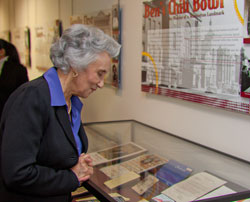
Co-founder of Ben's Chili Bowl Virginia Ali views pieces that she donated to the Ben's Chili Bowl Collection at Gelman Library during a special ceremony in February.
|
|
George Welcomes…
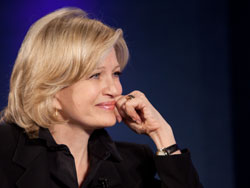
News anchor Diane Sawyer drew a record Kalb Report crowd as part of the International Conference of Women Media Leaders, a summit on the role and status of women in the news media held at GW in March.
Jessica McConnell Burt
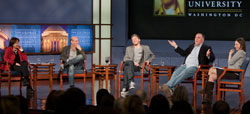 GW's Urban Food Task Force hosted a panel packed with renowned D.C. chefs in March. (Left to right) Nora Pouillon, Todd Gray, Spike Mendelsohn, and José Andrés discussed a variety of issues on the ethics of cooking, from choosing between corn-fed and grass-fed beef to the relative merits of local food. Blogger and food writer Jane Black (far right) moderated the discussion in front of a sold-out audience. GW's Urban Food Task Force hosted a panel packed with renowned D.C. chefs in March. (Left to right) Nora Pouillon, Todd Gray, Spike Mendelsohn, and José Andrés discussed a variety of issues on the ethics of cooking, from choosing between corn-fed and grass-fed beef to the relative merits of local food. Blogger and food writer Jane Black (far right) moderated the discussion in front of a sold-out audience.
Jessica McConnell Burt
|
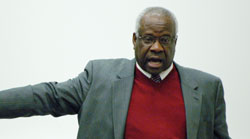 In March, Interim Law School Dean Gregory Maggs' Contracts II students received an impressive surprise guest lecturer: U.S. Supreme Court Justice Clarence Thomas, who not only spoke on a range of issues but also took questions from the class. As one of Justice Thomas' former clerks, Dean Maggs arranged this inside look into how a justice comes to a decision in a case and the process he employs in his chambers. In March, Interim Law School Dean Gregory Maggs' Contracts II students received an impressive surprise guest lecturer: U.S. Supreme Court Justice Clarence Thomas, who not only spoke on a range of issues but also took questions from the class. As one of Justice Thomas' former clerks, Dean Maggs arranged this inside look into how a justice comes to a decision in a case and the process he employs in his chambers.
Claire Duggan
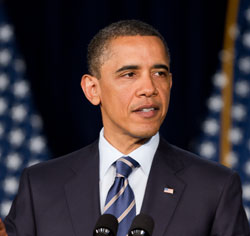
President Barack Obama chose GW's Jack Morton Auditorium to announce his deficit reduction plan, which called for a mix of tax increases for the wealthiest Americans and spending cuts that would lower the federal deficit by $4 trillion over the next 12 years.
William Atkins
|
Arts and Sciences Honors
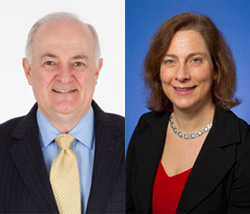
William Atkins
GW President Steven Knapp and Martha Finnemore, professor of political science and international affairs, were elected members of the American Academy of Arts and Sciences—one of the nation's most prestigious honorary societies and a leading center for independent policy research.
"It is truly an honor to join Professor Finnemore and so many distinguished colleagues as a newly elected fellow of this renowned institution," Dr. Knapp says. "It is also humbling to reflect on the extent of the academy's contributions, over more than two centuries, to our nation's knowledge and welfare."
Each year, AAAS elects men and women with exceptional achievement in science, scholarship, business, public affairs, or the arts. Distinguished members have included George Washington, Benjamin Franklin, Albert Einstein, and Winston Churchill. Today, there are more than 4,000 fellows, including more than 250 Nobel laureates and more than 60 Pulitzer Prize winners.
Dr. Knapp, Dr. Finnemore, and their fellow new members were elected in April and will be inducted into AAAS at a ceremony on Oct. 1 at the academy's headquarters in Cambridge, Mass.
The Surprise of a Lifetime
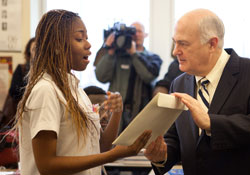
President Steven Knapp surprises Hope Ajayi of McKinley Technology Senior High School with a full-ride undergraduate scholarship to GW.
William Atkins
The Stephen Joel Trachtenberg Scholarship Award provides academically exceptional D.C. students with a $200,000 grant covering tuition, room, board, and academic expenses at GW. In March, President Steven Knapp and other university officials presented nine students with news of their award—tracking some down in their classrooms.
This year's scholarship recipients will join the 124 District students who have achieved this distinction since the program began 22 years ago. GW selects students based on class rank, GPA, SAT scores, course of study, teacher recommendations, leadership qualities, community service, and other extracurricular activities and achievements, as well as demonstrated need. Students are nominated for the awards by their high school counselors and then participate in a scholarship application and interview process before being chosen. All D.C. residents graduating from an accredited D.C. high school—public, charter, or private—are eligible to receive the scholarship provided the student demonstrates financial need.
To date, the university has committed more than $16.5 million to the program.
A Distinguished Seat
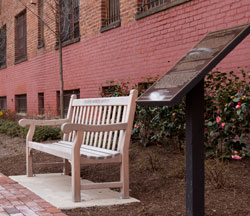
Jessica McConnell Burt
GW has established a new public service scholarship dedicated to the late Dorothy Height, a leader in both the African- American and women's rights movements. The $10,000 scholarship will be given each year to incoming first-year students with financial need and a personal commitment to public service. GW also unveiled a new bench that will serve as a campus memorial to Dr. Height, located behind GW's Graduate School of Education and Human Development and next to the all-women residence hall Strong Hall.
At a Glance
Funding Stone Stories
Jeffrey Cohen, professor of English and director of the GW Medieval and Early Modern Studies Institute, has received a grant from the prestigious Guggenheim Foundation. Dr. Cohen will conduct archival work at the British Library and work on his book, Stories of Stone: Dreaming the Prehistoric in the Middle Ages.
Dr. Cohen was one of 180 applicants—out of more than 3,000—to win a Guggenheim fellowship. He also won an American Council of Learned Societies Fellowship, which will help fund his book.
Dancing in Mongolia
Dana Tai Soon Burgess, chair of GW's Department of Theatre and Dance, led a dance and education initiative in Ulaanbaatar, Mongolia, directing master classes for Mongolian students of all levels for 10 days in March.
Mr. Burgess' international excursion was supported by the U.S. Embassy in Mongolia and the Department of State Bureau of Educational and Cultural Affairs, which gave him an $11,000 travel grant. Mr. Burgess, who stresses the ability of dance to bridge cultural barriers, says he is one of only "a handful of contemporary American dancers to work in Mongolia."
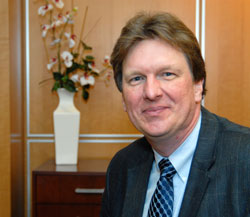
Julie Woodford
A Fluid Fellow
Michael Plesniak, chair of GW's Department of Mechanical and Aerospace Engineering, has been named a fellow of the American Association for the Advancement of Science for his research and leadership in fluid dynamics. He was also selected as the 2011 Engineer of the Year for the American Institute of Aeronautics and Astronautics—National Capital Section. Since joining the School of Engineering and Applied Science in 2008, Dr. Plesniak has focused his research on biomedical flows, including speech production and cardiovascular flows.
"Life depends on fluid flow and heat transport. Blood flow and the respiratory system are essentially what make life possible," Dr. Plesniak says. "There are so many different areas and opportunities for me to apply my expertise in fluid dynamics to medical applications."
International Education Appointment
The Association of International Education Administrators has a new president—Donna Scarboro, GW's associate vice president for international programs.
Dr. Scarboro, who joined GW in 1983 as a faculty member in the English department, has initiated several study abroad programs as well as the Summer Scholars program for high school students, the U.S. Foreign Policy Institute, and the Online Learning Initiative at GW. She is currently working on expanding GW's study abroad offerings to include new programs in Africa, Israel, and Argentina, and a new four-year international scholars program for 25 incoming freshmen who will study abroad their entire junior year.
"The international dimensions of higher education are evolving faster than ever," says Dr. Scarboro, who began her three-year term in February.
China Fulbright
Political management professor Dennis Johnson is spending next academic year in China on a Fulbright Distinguished Lectureship, one of 19 China lectureships the Fulbright scholarship program handed out this year.
Dr. Johnson is teaching courses on American domestic public policy and national political institutions at Jinan University in Guangzhou and is giving lectures throughout China on current American politics and policy.
World Executives
Students can now receive an MBA in 16 months, with opportunities for hands-on residencies in Washington and around the world with the School of Business' new World Executive MBA program. The program's core curriculum will focus on themes like ethical leadership, understanding the global economy, and mastering business functions.
The Triple Helix
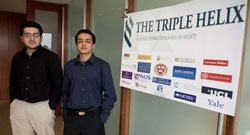
William Atkins
Inspired by President Obama's "Educate to Innovate" campaign, which encourages American students to reach the top of the science and math fields, two students have established a GW chapter of Triple Helix, an international journal showcasing undergraduate voices on scientific topics.
"It was the idea that the U.S. needs leadership and innovation in the field of science that inspired Faisal and me to start Triple Helix at GW," says sophomore Hamza Rahimi, who founded the journal with his brother Faisal and added that the chapter recruits students from all disciplines to research and write articles that "analyze critical and leading issues in science from their perspective."

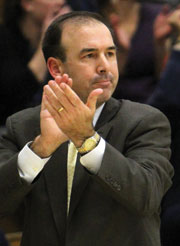








 GW's Urban Food Task Force hosted a panel packed with renowned D.C. chefs in March. (Left to right) Nora Pouillon, Todd Gray, Spike Mendelsohn, and José Andrés discussed a variety of issues on the ethics of cooking, from choosing between corn-fed and grass-fed beef to the relative merits of local food. Blogger and food writer Jane Black (far right) moderated the discussion in front of a sold-out audience.
GW's Urban Food Task Force hosted a panel packed with renowned D.C. chefs in March. (Left to right) Nora Pouillon, Todd Gray, Spike Mendelsohn, and José Andrés discussed a variety of issues on the ethics of cooking, from choosing between corn-fed and grass-fed beef to the relative merits of local food. Blogger and food writer Jane Black (far right) moderated the discussion in front of a sold-out audience.  In March, Interim Law School Dean Gregory Maggs' Contracts II students received an impressive surprise guest lecturer: U.S. Supreme Court Justice Clarence Thomas, who not only spoke on a range of issues but also took questions from the class. As one of Justice Thomas' former clerks, Dean Maggs arranged this inside look into how a justice comes to a decision in a case and the process he employs in his chambers.
In March, Interim Law School Dean Gregory Maggs' Contracts II students received an impressive surprise guest lecturer: U.S. Supreme Court Justice Clarence Thomas, who not only spoke on a range of issues but also took questions from the class. As one of Justice Thomas' former clerks, Dean Maggs arranged this inside look into how a justice comes to a decision in a case and the process he employs in his chambers.




